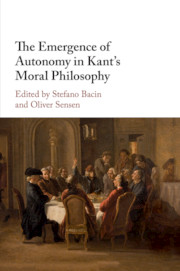Book contents
- The Emergence of Autonomy in Kant’s Moral Philosophy
- The Emergence of Autonomy in Kant’s Moral Philosophy
- Copyright page
- Contents
- Contributors
- Acknowledgments
- Abbreviations and Translations
- Introduction
- Chapter 1 How Is Moral Obligation Possible?
- Chapter 2 Anticipations of Autonomy
- Chapter 3 Autonomy and Moral Rationalism
- Chapter 4 Autonomy and Moral Empiricism
- Chapter 5 Elements of Autonomy in Kant’s Lectures on Ethics (1770–1780)
- Chapter 6 Emerging Autonomy
- Chapter 7 Autonomy and the Legislation of Laws in the Prolegomena (1783)
- Chapter 8 How Can Freedom Be a Law to Itself?
- Chapter 9 Moral Autonomy as Political Analogy
- Chapter 10 What Emerged
- Chapter 11 Kant’s Threefold Autonomy after the Groundwork
- References
- Index
Chapter 5 - Elements of Autonomy in Kant’s Lectures on Ethics (1770–1780)
Published online by Cambridge University Press: 05 October 2018
- The Emergence of Autonomy in Kant’s Moral Philosophy
- The Emergence of Autonomy in Kant’s Moral Philosophy
- Copyright page
- Contents
- Contributors
- Acknowledgments
- Abbreviations and Translations
- Introduction
- Chapter 1 How Is Moral Obligation Possible?
- Chapter 2 Anticipations of Autonomy
- Chapter 3 Autonomy and Moral Rationalism
- Chapter 4 Autonomy and Moral Empiricism
- Chapter 5 Elements of Autonomy in Kant’s Lectures on Ethics (1770–1780)
- Chapter 6 Emerging Autonomy
- Chapter 7 Autonomy and the Legislation of Laws in the Prolegomena (1783)
- Chapter 8 How Can Freedom Be a Law to Itself?
- Chapter 9 Moral Autonomy as Political Analogy
- Chapter 10 What Emerged
- Chapter 11 Kant’s Threefold Autonomy after the Groundwork
- References
- Index
Summary
- Type
- Chapter
- Information
- The Emergence of Autonomy in Kant's Moral Philosophy , pp. 83 - 101Publisher: Cambridge University PressPrint publication year: 2018
- 19
- Cited by



